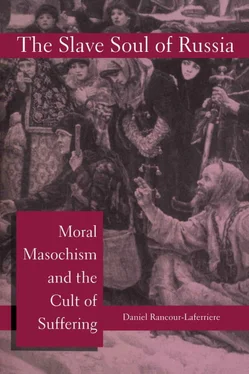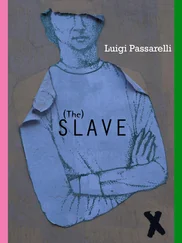A particularly sharp critique of serfdom was made by the philosopher Petr Iakovlevich Chaadaev (1794–1856). In the first of his famous Philosophical Letters , written in French in 1829, he said:
Why… did the Russian people descend to slavery [l’esclavage] only after they became Christian, namely in the reigns of Godunov and Shuisky? Let the Orthodox Church explain this phenomenon. Let it say why it did not raise its maternal voice against this detestable usurpation of one part of the people by the other. And note, I pray you, how obscure we Russians are in spite of our power and all our greatness. Only today the Bosphorus and the Euphrates have simultaneously heard our canon thunder. Yet history, which at this very hour is demonstrating that the abolition of slavery is the work of Christianity, does not suspect that a Christian people of forty million is in chains. 67
Chaadaev clearly disapproves of slavery, but he does not really direct his disapproval at the original enslavers, that is, at “our national rulers” who he believes inherited the spirit of “cruel and humiliating foreign domination” from the Mongols. Rather, he criticizes the Russian Orthodox Church for not intervening on behalf of the Russian people. For Chaadaev, official Russian Christianity is despicable for its failure to act. It is more backward, less truly Christian than Christianity in the West (he forgets the Christianity of the American South). He seems to suggest that the Russian Orthodox Church was itself behaving slavishly when it acceded to slavery in Russia.
Chaadaev utilizes an interesting familial image here: the Russian Orthodox Church did not raise its maternal voice (“sa voix maternelle”) against serfdom. In effect, the Russian church is not as good a mother as the Roman Catholic Church which, since the time of Tertullian, had been known as Domina mater ecclesia .
Where there is a mother, a child cannot be far behind. For Chaadaev that child is Russia herself, or individual Russians:
We live only in the narrowest of presents, without past and without future, in the midst of a flat calm. And if we happen to bestir ourselves from time to time, it is not in the hope, nor in the desire, of some common good, but in the childish frivolousness of the infant, who raises himself and stretches his hands toward the rattle which his nurse presents to him. 68
Chaadaev repeatedly resorts to the image of a child: “we Russians, like illegitimate children, come to this world without patrimony”; “We are like children who have never been made to think for themselves.” 69
Russian “children” lack not only a sufficiently maternal church, but a real legal system as well. As a result, according to Chaadaev, childish Russians come to expect, even welcome punishment from the paternal figure of the tsar, traditionally referred to as “little father tsar” (“tsar’ batiushka”) by Russians. The rule of law is utterly alien to Russians: “For us it is not the law which punishes a citizen who has done wrong, but a father who punishes a disobedient child. Our taste for family arrangements is such that we lavish the rights of fatherhood on anything that we find ourselves dependent on. The idea of lawfulness, of right, makes no sense to the Russian people.” 70
So, childish, inadequately mothered Russians live an abominable life. They willingly subject themselves to paternal authority. Incapable of asserting their rights, they only know how to ask permission: “Nous ne disons pas, p. e., j’ai le droit de faire cela, nous disons, telle chose est permise; telle autre ne l’est pas.” 71
Russians also enslave one another. Chaadaev, himself an owner of serfs, is racked with guilt. He has ideals of freedom, but he cannot live up to them, consequently his self-esteem is lowered: “Weighed down by this fatal guilt, what soul is so fine that it will not wither under this unbearable burden? What man is so strong that, always at odds with himself, always thinking one way and acting another, he does not in the end find himself repulsive?” 72Given this attitude, it is not surprising that Chaadaev was subject to fits of depression.
The First Philosophical Letter , recalled Aleksandr Herzen, was “a shot that rang out in the dark night.” 73It provoked an uproar when it was published in Russia in 1836. The tsar got wind of the scandal and the journal in which Chaadaev’s work had appeared was closed down. Chaadaev himself was placed under house arrest and—more than a century before psychiatric abuse was reinvented in the Soviet Union—Chaadaev was officially declared insane by the tsarist authorities. For over a year he endured daily examinations by a physician.
An essay ironically titled The Apology of a Madman (1837) was one result of this very frustrating situation. In it Chaadaev, among other things, takes back some of the criticism he had directed at Russian Christianity. The Russian Orthodox Church is now praised for its humility rather than castigated for its servility. 74The Russians as a whole (not just serfs or the clergy) are characterized as submissive, but this feature now has a positive aura:
Fashioned, moulded, created by our rulers and our climate, we have become a great nation only by dint of submission [force de soumission]. Scan our chronicles from beginning to end: on each page you will find the profound effect of authority, the ceaseless action of the soil, and hardly ever that of the public will. However, it is also true that, in abdicating its power in favor of its masters, in yielding to its native physical climate, the Russian nation gave evidence of profound wisdom. 75
Just what this “wisdom” was Chaadaev does not make clear in 1837. But in his later years he changes his mind again and criticizes the Russian slave mentality: “Everything in Russia bears the stamp of slavery [le cachet de la servitude]—customs, aspirations, enlightenment, even freedom itself, if such can even exist in this environment.” 76In 1854, during the Crimean War, he says:
Russia is a whole separate world, submissive to the will, caprice, fantasy of a single man, whether his name be Peter or Ivan, no matter—in all instances the common element is the embodiment of arbitrariness. Contrary to all the laws of the human community, Russia moves only in the direction of her own enslavement and the enslavement of all the neighbouring peoples. For this reason it would be in the interest not only of other peoples, but also in that of her own that she be compelled to take a new path. 77
It is clear from his changes of opinion that Chaadaev must have harbored contradictory feelings about the submissiveness of Russians. A close reading of his works demonstrates that he experienced an intense ambivalence toward the idea of submissiveness generally. His psyche harbored both masochistic and antimasochistic impulses. 78
Native Russians like Radishchev and Chaadaev were not the only ones to comment on the subject of Russian slavishness. Foreign visitors could not miss it either. A good example is the Polish poet Adam Mickiewicz (1798–1855), who was in Russia from 1824 to 1829. The “Digression” of his Forefathers’ Eve, Part III (1832) offers, among other things, a satire of Russian servility. Mickiewicz tells an anecdote about a peasant servant found frozen to death on the field of Mars in Petersburg. It seems the peasant had been ordered by his master, a callous young army officer, to sit still and guard a fur coat. The officer had not come back for his coat, and the servant, rather than disobeying orders by donning the warm coat, literally froze on the spot. The narrator comments:
Oh, poor peasant! your heroism, a death like that,
Is commendable for a dog, but an offense for a human being.
How will they reward you? Your master will say with a smile
That you were loyal unto death—like a dog.
Oh, poor peasant! why do I shed a tear
And why does my heart quiver thinking of your deed:
Ah, I pity you, poor Slav!—
Poor nation! I pity your fate,
You know only one heroism—the heroism of slavery. 79
Читать дальше












